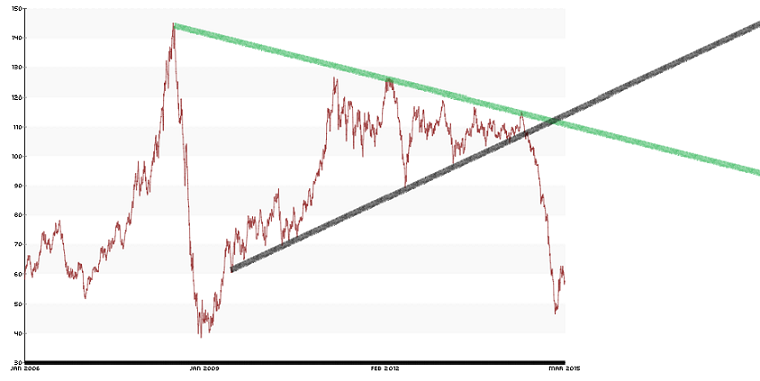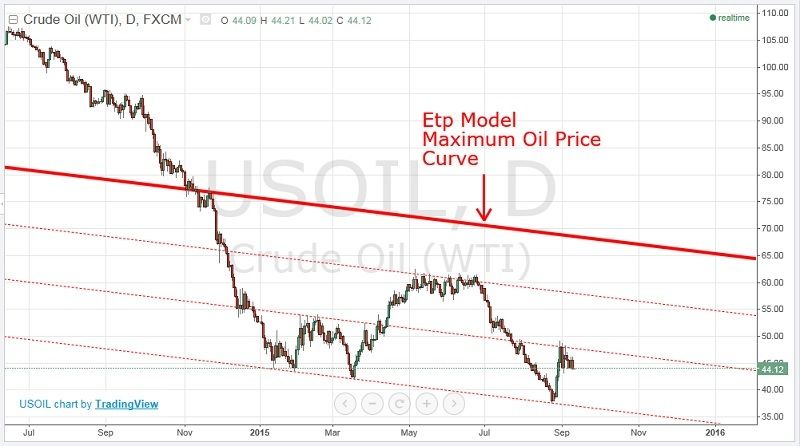Write4U
Valued Senior Member
I believe it's called "potential usable energy".Futilitist,
Whatever said:
"The embedded energy in the oil production system is not actual energy."
Great question, Write4U. Thank you.
Here is what BWHill says (from the Etp book):
"Although qualitative indicators point to the world's oil reserves being in an advanced stage of depletion, the investor/planner needs more than qualitative reports about the petroleum depletion event. They need quantitative estimates about what to expect from its price and availability over a period great enough to plan and execute a project. With capital difficult, and expensive to procure an energy surprise has gained the capacity to place many projects, that would have otherwise excelled, over budget and behind schedule. The scope of any project of significant duration can not today be effectively ascertained without considering the potential impact of the depletion of our most widely used and efficacious commodity. Depletion: A determination for the world's petroleum reserve provides the planner and astute investor with the specific information they will need to define and effectively pursue their objectives!"
...
"Petroleum depletion is further advanced, and its production will decline faster than generally assumed. Conventional reservoir appraisal methods are founded on First Law premises, but neglect Second Law effects. Although extremely applicative to individual field analysis, when applied to the status of the world's petroleum reserve they produce inconsistent results. In consequence, the last 25% of the world's energy supplying reserve will be orders of magnitude more costly to produce than was the first 25%. The advancing depletion of the world's petroleum reserve could bring about changes of a magnitude that have not been witnessed for millennium! To navigate this conflicting, and difficult era an understanding of the events taking place will be essential. It is our hope that this report will contribute to that endeavor."
~BWHill
Civilization is very complex. We need good forecasting tools to plan effectively. Our survival depends on it. If we just ignore the bad news all the time, and pretend everything is fine, we will surely be blind sided. Hoping for the best is okay as long as you plan for the worst. ---Futilitist
Ok, all that makes sense to me, but the use of the result of thermodynamic functions of oil seems to have been well established ?
If we start with the potential energy contained in a gallon of crude and then compare this to the actual energy contained in a gallon of processed oil (gasoline at the pump) we can exactly calculate the thermodynamic losses (entropy) of the oil being processed.
The constant here is that thermodynamics of extraction and processing and refining, once established, results in a fixed cost per gallon to produce.
When this process changes, such as drilling deeper, fracking, better methods of refining, the cost per gallon can be accurately calculated and adjusted to still yield a profit for the producers.
When we compare the exponential depletion of oil with the actual cost of processing, it becomes clear (to me) that when the same processes yield less and less crude, or even stops from total depletion of a well (abandonment), that well is no longer part of the equation, which also can be calculated very precisely, but this process will be gradual as wells close at irregular intervals.
While obvious oil and the energy it produces are subject to thermodaynamic functions, it seems to me the most inaccurate way of predicting "the price of oil", other than explaining the underlying thermodynamic functions which are causal to the energy loss from crude to refined. This function cannot be manipulated, it is a natural law.
But from my experience in business, cost (price) of anything, is directly related to cost of production and delivery, plus a margin of profit. Actually a very simple equation.
But the causes for price fluctuations are of not attributable to thermodynamic functions, but to the cost of refining, cost of delivery and greed of the seller (just saw an old picture of Katrina where a gallon of gas cost 16.99) and cannot be predicted with any percentage of confidence. The prediction of prices going down even as supply (of an essential commodity) dwindles, is counter intuitive, unless the suicidal principle of "strength through exhaustion" is applied.
But I just cannot imagine a direct connection with thermodynamics of a gallon of still sequestered (untapped) crude oil and an accurate pricing model of the availability of that still unknown quantity. The price of oil on the market has already been calculated with great precision.
One thing is sure, we will run out in the near future (as compared to a human lifetime) and I have yet to see a reliable substitute to feed the industrial monster we have created.
In another thread the driver ant was cited as a destructive force. But driver ants only raid when supplies run short and need to be replenished to sustain the hive. Again this reminds me of Trump ( a candidate for the presidency) advocate invading the oil rich countries and just taking their oil, a clear sign of driver ant mentality.
I am trying, but failing to find a direct connection of the law of thermodynamics (other than natural thermal disasters) and the price of oil.
I have never heard of the concept that rare minerals are cheaper than abundant minerals. On the contrary, ...............
Can you explain why oil depletion should result in lower prices, when oil is used for so many other applications than than fuel?
And why thermodynamics would have anything to do with that?
How does ETP predict prices other than in an already known equation?


